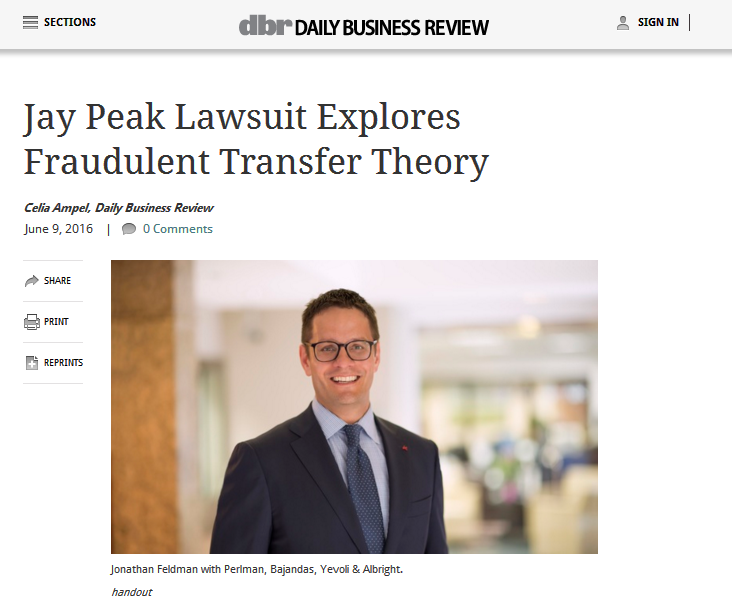Jay Peak Lawsuit Explores Fraudulent Transfer Theory
A new lawsuit in the Jay Peak saga uses a legal theory that plaintiffs counsel says is untested in Florida state court: If a financial institution touches money, even for a second, it must try to make sure it isn't being used for fraud.
Jonathan Feldman of Perlman, Bajandas, Yevoli and Albright in Miami filed the case June 3 against Raymond James Financial Inc. on behalf of several immigrant investors in the Jay Peak projects in Vermont, which included ski resort improvements and a biotech plant.
Jay Peak owner Ariel Quiros of Key Biscayne and his business partner, Bill Stenger of Vermont, allegedly diverted $200 million of investor funds, including $50 million for Quiros' personal benefit, according to the Securities and Exchange Commission.
The pair raised about $350 million through the EB-5 program, which allows foreigners to invest $500,000 in U.S. job creation in exchange for a visa.
Feldman's Miami-Dade Circuit Court lawsuit claims Raymond James should be held liable for helping Quiros and Stenger defraud investors. As a broker for bank accounts holding investor funds, the St. Petersburg-based company gave Quiros margin loans collateralized with that money.
The pair's Raymond James accounts were managed by Joel Burstein, Quiros' then-son-in-law, and Burstein did not stop funds from being "misused from day one" even though he knew the money was for EB-5 investment purposes, Feldman said.
Raymond James declined to comment on the allegations Thursday.
Feldman's case is one of a handful of Jay Peak investor lawsuits against Raymond James.
The receiver for the Jay Peak companies, Michael Goldberg of Akerman in Miami, filed a complaint against the investment firm May 20 in Miami federal court. The claims include fraudulent transfer, aiding and abetting a breach of fiduciary duty and violations of the Racketeering Influenced and Corrupt Organizations Act.
Another federal lawsuit filed May 3 by Coral Gables attorneys with Kozyak Tropin & Throckmorton makes similar allegations, but as a class action.
"The real difference with our lawsuit is that we are utilizing a fraudulent transfer theory that hasn't ever really been used in state court, to my knowledge," Feldman said.
The fraudulent transfer theory says that any company that holds money at any point in a transfer can be held liable if that money is used fraudulently. Quiros transferred interest fee and cost payments from the Jay Peak companies to Raymond James, according to court documents.
"Raymond James touched the money for an infinitesimal second, but they touched it," Feldman said.
In federal court, banks often use the "mere conduit" defense, which is "a practical recognition that banks touch money all the time, and they're not obligated to understand what the purpose of that money is," he said.
A Miami lawyer is suing investment firm Raymond James Financial Inc. over the Jay Peak scandal, using a legal theory he says hasn't been tested in Florida state court.
Mentions
- Vermont EB5 Regional Center
- UNITED STATES SECURITIES AND EXCHANGE COMMISSION
- Ariel Quiros
- Bill Stenger
- Joel Burstein
- Akerman LLP
Litigation Cases
- State of Vermont vs Bill Stenger & Ariel Quiros
- UNITED STATES SECURITIES AND EXCHANGE COMMISSION vs Ariel Quiros & Bill Stenger
States
- Vermont
Videos





Subscribe for News
Site Digest
Join Professionals on EB5Projects.com →
Securities Disclaimer
This website is for informational purposes only and does not constitute an offer or solicitation to sell shares or securities. Any such offer or solicitation will be made only by means of an investment's confidential Offering Memorandum and in accordance with the terms of all applicable securities and other laws. This website does not constitute or form part of, and should not be construed as, any offer for sale or subscription of, or any invitation to offer to buy or subscribe for, any securities, nor should it or any part of it form the basis of, or be relied on in any connection with, any contract or commitment whatsoever. EB5Projects.com LLC and its affiliates expressly disclaim any and all responsibility for any direct or consequential loss or damage of any kind whatsoever arising directly or indirectly from: (i) reliance on any information contained in the website, (ii) any error, omission or inaccuracy in any such information or (iii) any action resulting therefrom.



